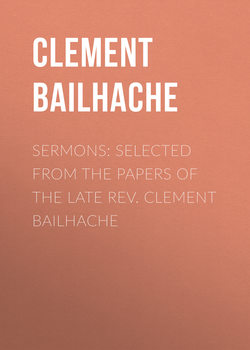Читать книгу Sermons: Selected from the Papers of the Late Rev. Clement Bailhache - Clement Bailhache - Страница 6
V.
THE HUMBLE TAUGHT THE LORD’S WAY
Оглавление“The meek will He teach His way.” – Psalm xxv. 9.
Instead of “meek” read “humble,” and then connect the verse with the preceding, so as to see who and what are the persons to whom the Psalmist refers. The righteous Lord will teach sinners His way; but the sinners, in order to be thus divinely taught, must be humble.
Probably this text of Scripture does not seem at first sight to be very promising to some of you. If so, the reason probably is that one at least of the subjects it brings to our notice is not a favourite or inspiring one. Men are comparatively little attracted by the more quiet and passive virtues of life, and among these the virtue of humility is one of the least popular. The truth is that we are still under the influence of Pagan notions about it. The philosophers of the past never understood it. To them it was a mean and despicable thing – the evidence of weakness and poverty of soul, the necessary virtue of the enslaved and the helpless. This notion exists now. The world has far more respect for the self-confident, the noisy, the bombastic, than for the humble. Of course the world’s ideas of humility are at fault, and have need to be corrected. We cannot enter upon that task now, except incidentally and very partially. One thing only let me say – namely, that Christianity has transformed and ennobled the despised word by giving us the thing itself. The life of Christ comprises the perfection of humility as well as of every other virtue. In Him we see that humility makes no man contemptible. He was no less a king because He was a servant. And the virtue that was perfect in Him is one of the essential qualities of the Christian character – one of the essential elements of the Christian life, whether in its high enjoyments or in its high achievements.
The words before us present this virtue of humility under one special aspect. Man has something to learn, and God has something to teach; and humility is teachableness. Christianity demands of its disciples that disposition of heart which is the indispensable condition of all learning whatsoever. No more objection can be urged against Christianity for this, than against any art or science or philosophy which men seek to acquire. All these might say to their disciples, “Unless you give up your prejudice, your conceit, your self-will, your presumption, you have no business here; we have nothing to teach you.” And so, “poverty of spirit,” as Christ intimates in the “Beatitudes,” is the strait gate into “the kingdom of God.”
It is only as respects religion that this principle is seriously misunderstood, and a little reflection will show why it is that outside Christianity humility is misapprehended. Humility is the result of self-knowledge, and this cannot be obtained until man has learned to know himself in the light of God’s wisdom and holiness. So long as he compares himself with his fellow-creatures around him, it may seem to him that there is no necessity for such an element of character as this. Nor is it in this way that the virtue is commended and enforced. Whilst the standard of excellence remains merely human, it is quite clear that a man may say, “I am as good as my neighbours; at least, I am no worse.” But put before him a holy God and a holy law! In this new light all becomes changed. Apart from that revelation, many flatter themselves that they have lived respectably. They are not conscious of any serious defection in the common, every-day duties of life. Let the great revelation come to them, and they must make wonderful self-discoveries. How many forgotten sins are then brought to mind! How many secret sins are then brought to light! How many temptations have been yielded to for convenience’ sake! How much coldness and indifference towards the right, the true, and the good! How much selfishness! How much cowardice! How many meannesses! How many secret and contemptible dishonesties! What culpable ignorance of God! What rebellion against His known will! Is not all this enough to humble a man? Where is the man amongst us who would not rather die than have all his sins brought to light before his fellow-men? Thus, to make us humble, God teaches us, first of all, truly to know ourselves. This is that “conviction of sin” which is wrought by His Holy Spirit.
God teaches us this in His law, but chiefly by the life of Christ His Son. Who can remain proud when he compares his own life with that? Before men we may, perhaps, hold our own; but before Him there is nothing left for us but self-abasement.
In presence of such a conviction as this, it is vain for the world to flatter a man, for he has learnt his own misery. He wants to know the truth, for it is only the truth that can save. He knows too much of himself to accept any teaching that would exalt man, for he could not accept that without dishonouring God. He wants a frank, firm voice that will trouble him, and to which his conscience will respond. The first question for us is: Have we so learnt to know ourselves, or do we obstinately shut our eyes against God’s light? Such a knowledge of sin brings with it a sense of deserved condemnation.
